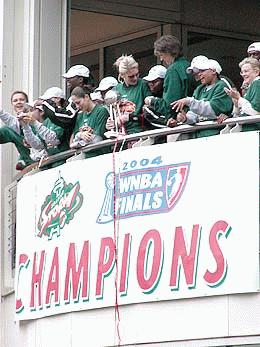On February 29, 2008 -- a Leap Day -- the Seattle Storm is sold to four local women, ending months of uncertainty about the team's future. The sellers, a group of Oklahoma businessmen headed by Clayton "Clay" Bennett, had taken steps to move both the Storm and its National Basketball Association (NBA) counterpart, the Seattle SuperSonics, to Oklahoma City. Bennett initially insisted that the franchises would not be split, but later acknowledged that fan support for the Storm in Seattle could not be easily replicated in Oklahoma City. He and his partners agreed to sell the women's team, for $10 million, pending approval by the Women's National Basketball Association (WNBA); they remained committed to relocating the Sonics.
The sale of the Storm was completed the day after the WNBA’s board of governors gave it their blessing. "This is an exciting day for all the fans who have been so loyal to the Storm over the years," said Anne Levinson (b. 1958), who negotiated the transaction. "For us to have been able to provide the league with a letter signed by nearly 1,200 fans, resolutions from government leaders, and strong growth in ticket sales and sponsorships over just the past six weeks speaks to the incredible support from the fans and the community and is evidence of how much this team means to the Seattle region" (Seattle Post-Intelligencer, February 29, 2008).
The Storm Reigns
Professional women’s basketball came to Seattle in 1996 with the debut of the Seattle Reign, one of 12 charter members of the American Basketball League. The team built a small but dedicated base of fans before it, and the league, folded in December 1998. The Storm, established in 2000 as an expansion franchise in the WNBA, drew larger and even more enthusiastic crowds, especially after winning the league’s national championship in 2004. Attendance at home games averaged nearly 8,000 in 2007, and more than 2,400 season tickets were sold.
The team’s longtime fans include the four women who became its new owners: Levinson, an attorney who had served as chair of the Washington State Utilities and Transportation Commission and as deputy mayor of Seattle; Lisa Brummel (b. 1959), senior vice president for human resources at Microsoft; Dawn Trudeau (b. 1957), a former Microsoft executive, now involved with the development of nonprofit organizations; and Ginny Gilder (b. 1958), owner of an investment business and president of a family philanthropy.
Anne Levinson, who helped bring the Reign to Seattle in 1996, organized the group. She told the Seattle Post-Intelligencer that the women had gotten to know each other by serving on boards and charitable committees together. Each of them also had been an athlete in college, in programs that benefited from Title IX of the federal Education Amendments of 1972, which, among other things, banned sex discrimination in school sports. Ginny Gilder, a rower, won a silver medal at the Olympic Games in Los Angeles in 1984.
Governor Chris Gregoire was among those who cheered the sale. "As governor and as a Storm fan, I think this is a terrific result," she said. "This group of accomplished women has made this possible because of their strong commitment to the community. They also know firsthand that being able to compete in the top echelon of sports provides women with opportunities generations who came before us never had" (P-I, January 9, 2008).
The sale makes the Storm the second franchise in the 14-team WNBA to be owned exclusively by women, after the Los Angeles Sparks, and the seventh to be owned independently of the NBA. Separation from the men’s league brings financial challenges for the new ownership group. The team will now have to pay its own rent at KeyArena (the same building the Sonics are trying to escape); and it will have to pay for its own marketing, advertising, and administrative support, which were once handled by the Sonics’ front office.
Still, the owners -- incorporated as Force 10 Hoops LLC -- expect to turn a profit, eventually. "We came here to run this as a business," Brummel said. "There are a lot of factors that go into that. There will be a road to getting that business to be on a sustainable platform." By "sustainable," she added, she means "profitable" (P-I, January 9, 2008).

